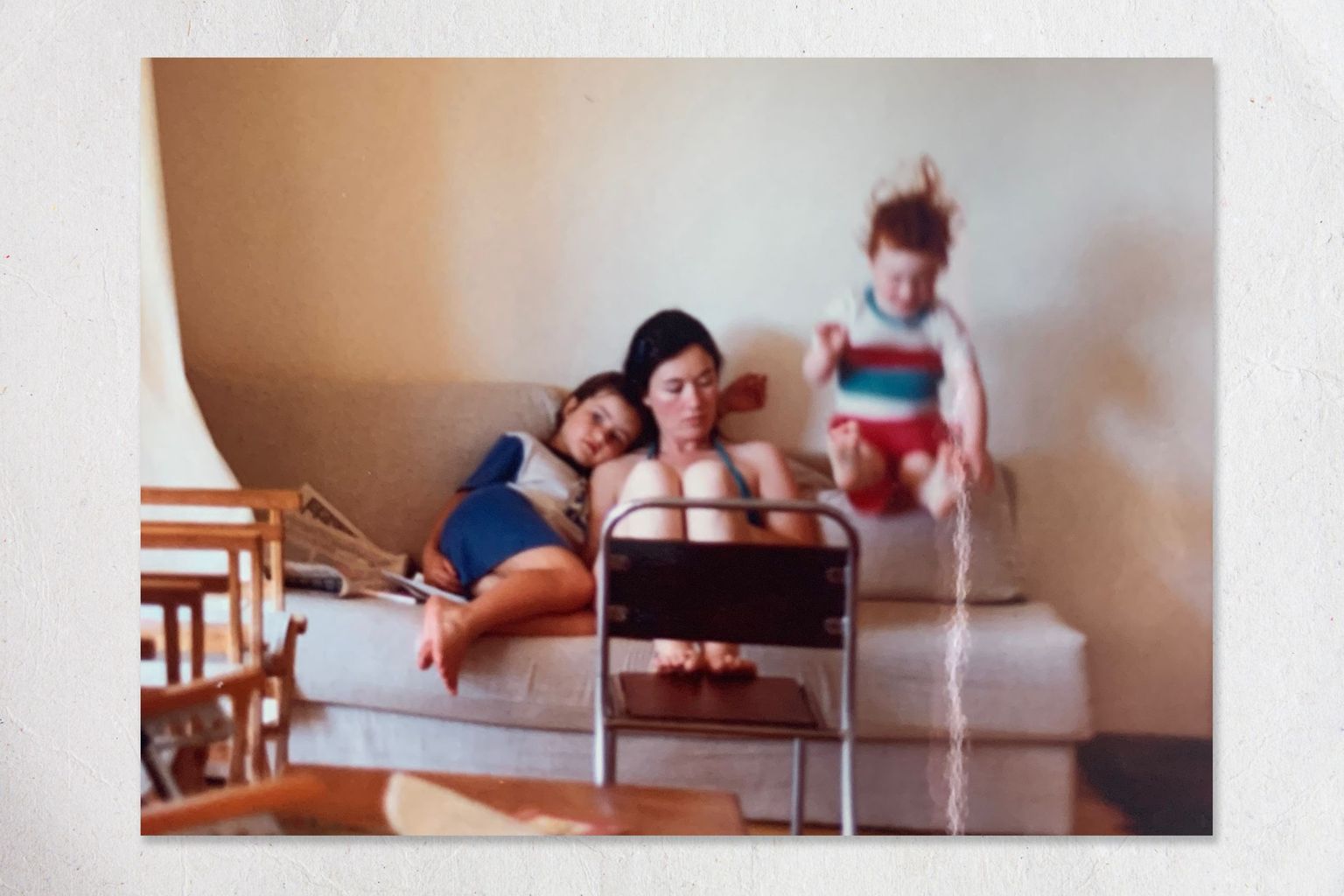‘Dad, can you tell us a story?’: Growing up with John Clarke
In her new memoir on growing up with a famous comedian as a father, Lorin Clarke reflects on the mornings she spent in that most fertile ground for storytelling: the parental bed.

Lorin Clarke (far left) with her mother, Helen, and her little sister, Lucia, aka Wriggler. Photo supplied by the Clarke family.
This is an extract from Lorin Clarke’s memoir Would that be funny? Growing up with John Clarke, available now through Text Publishing.
Our parents’ room was the front room of our house in Greensborough, set back from the street, at the top of a driveway we called ‘the arched driveway’ because of the canopy of trees Dad had shaped into a dark, green, cool tunnel. The branches reached for each other like ballet dancers touching fingers and, if you lay on your back on the concrete, you could only see tiny keyholes of sky. The driveway was long and steep, and when you were inside the arched section, it was calm and quiet even when the day was not. If it was raining, the arched driveway was dry. If you ran down the drive from the top you had to be careful you didn’t go too fast too soon or you’d find yourself half-running, half-tumbling, lolloping downhill on rubbery legs you couldn’t control towards inevitable calamity.
I went back to look at the house recently and found myself wondering whether someone had been in and un-steepened the driveway since we lived there. I wondered that. All the way through to the end of the thought. Everything about Greensie, as we called the place we grew up in, lives large in my memory, like a magical secret land up that hill.
It was a normal-sized bedroom, Mum and Dad’s, but it seemed enormous on those weekend mornings when Lucia and I dived into their bed to begin our regular endeavour of begging for a story. One of the reasons the room seemed bigger was the large windows onto the garden. When I asked Lucia what she remembered about these mornings, she said the same thing straight away: you could lie in their bed and look out at the world. At the sky and the trees and the morning dew on Mum’s roses or the steam rising from the silver frost on the lawn. You could peer down at the giant messy bottlebrush bush, the sideways-leaning tree over the sandpit, or the ‘bamboo forest’ down near the fence. Rain would weep down the window during winter, warping the morning into shifting shades of green. In summer, sunlight would inch across the bed as the morning bloomed into the corners of the room. To avoid the glare, I positioned my head so that my eyes lined up with one of the window frames, the shadows providing a bar of shade, like wraparound sunglasses made of shadow.
Some mornings, the front lawn was already alive with a flock of cockatoos screeching and leaping about, torturing our dog, Linda the Dog, so named to distinguish her from family friend and respected academic Linda the Woman. Linda (the dog) was a neurotic mongrel with a dark past who would yelp and whine to be let out so she could assert her dominance over every living thing, her toenails picketty-picking across the kitchen lino until Dad roared the Fred Daggian ‘Settle down!’ and she went quiet for a bit.
Greensborough was an outer suburb, north-west of the city. Beyond the tall poplar trees that could be seen for miles, beyond the wooden fence that you could climb up and peep over (at risk of splinters), beyond the valley that dipped down over the other side of the street rose a typical suburban hill, far enough away to seem toy-like. You could watch a car drive down one of those tiny roads, using its teeny indicator—the click-click-click of the light converted to sound in your mind—and follow it as it pulled into a teeny-tiny driveway, where a teeny-tiny person would get out, and you could think about how they were probably having their own thoughts, about to go into their own house, with no idea someone could see them from so far away.
But we ignored all that, my sister and I, as we padded down the hall to our parents’ bedroom at goodness knows what time of morning. They would be, of course, asleep, and would attempt to remain so, cuddling us into them for more snoozing. This must have worked on a few occasions, but most of the time we attempted to engage them in conversation. Mum would usually answer if addressed directly, but Dad would fight off the official beginning of the day by answering only in grunts, to indicate that he was still asleep and couldn’t possibly be disturbed.
He was a worthy opponent in this game. You’d ask him a question and, eyes still closed, he would use only rhythm and intonation to enunciate his answer.
‘Dad, are we going to the shops today?’
‘Mm-mm.’
‘Are you getting up soon?’
‘Mm-mm.’ ‘Why not?’ ‘Mm-mm.’
It was hopeless, trying to trip him up, although Lucia and I tried to exploit the format for each other’s amusement.
‘Shall we have poo for breakfast, Dad?’
(Vehemently) ‘Mm-mm.’ To peals of laughter.
Once, the morning after Dad had let her stay up late to watch the golf with him, Lucia (who couldn’t have been more than six at the time) thought of a question that would tip Dad out of grunt mode and into actual words.
‘Daddy?’ she asked. ‘Who won the golf?’
Dad, eyes still closed, intoned, ‘Hm-hmm hm-hm-hm.’
‘Oh,’ she famously said, disappointed to have lost the game, ‘Robert Allenby.’
For the rest of his playing career, our family only ever spoke of Australian golfer Robert Allenby in syllables.
‘Did you see hm-hmm hm-hm-hm did well the other day?’
‘Oh yes, big day for hm-hmm hm-hm-hm.’
Once we were past the grunting, on those mornings, we got to the best bit.
‘Dad, can you tell us a story?’
Our favourite stories were, like the Br’er Rabbit stories he used to read to us at bedtime, part of a series featuring recurring characters stumbling through both triumph and disaster with unbridled enthusiasm. Our stories were called Wriggler and Giggler.
I have no idea how many Wriggler and Giggler stories there were, or what even happened in them, exactly. I asked Dad, as an adult, what they were about, and he chuckled and said he didn’t really know, he just made them up as he went along, usually with assistance from us. The key element of the stories, though, was familiarity.
Wriggler, who was about my sister’s age, could not sit still. She was quick and wriggly and a little impetuous. She would go outside in a gale wearing a singlet or leap from a tree in a death-defying attempt to get somewhere three seconds faster than she otherwise would have. Giggler, who was about my age, was silly and overconfident, leading the loyal Wriggler headfirst into poorly advised adventures. I remember our parents laughing together as they workshopped the names of the other characters in the Wriggler and Giggler stories. The family dog, they decided, was called Diggler. The names of the parents, arrived at after some discussion, were Niggler, the mum, always emerging with a niggling concern or presenting an obstacle of some kind, and (devised no doubt in retaliation) Piggler, the dad.
The adventures of Wriggler and Giggler (and Piggler and Niggler and Diggler) were tantalisingly adjacent to our own. We tingled with the excitement of recognising our exaggerated selves, calling out objections to the more heinous characterisations from the unreliable narrator and absolutely killing ourselves laughing. They often resembled our own family mythology. Like when Wriggler and Giggler went to the circus and Wriggler danced all night with the circus folk while Giggler ate every single cupcake from the fundraising table one by one, costing Niggler and Piggler vast sums of money in small change and causing the person in charge of sales to be so weighed down by coins that she could barely stagger home due to the sheer quantity. Meanwhile, Wriggler, gifted with both rhythm and tenacity, danced on so expertly that her fellow dancers, in awe of her natural talent, dropped like flies around her, fanning each other from the exhaustion of attempting to keep up with this tiny red-haired dynamo moving to the beat of her own drum. Niggler, all the while, kept sensibly suggesting it might be time to wrap things up and was ignored by everyone until, oracle-like, she rocked up later with a getaway car, having been right all along.
The narrator knew his audience, folding relevant cultural or historical events into the story, specific enough to make the subtext understood, but general enough to allow him to take the text in whatever direction he desired. We had all been to see the Flying Fruit Fly Circus and had loved it. I can still remember my favourite part: the gawky teenage boy who lumbered out into the middle of the stage, a tiny pot plant in his palm, and haltingly scoured the audience for its intended recipient, Mrs Jones. He raised his voice, leaving the stage to search the circus tent, walking past us through the rows as we settled into our seats. ‘Mrs Jones?’ We all looked around. There was no Mrs Jones. Flummoxed, he left the stage. He reappeared regularly, in between whatever else was happening, and each time the tiny pot plant had grown bigger until, by the end of the show, it was an enormous tree this kid had to haul about the place, which he did with the assistance of the least willing audience members he could find. It was the first time I remember loving theatre. So far as I was concerned, this was magic. Lucia doesn’t remember it, being barely out of toddlerdom at the time, but she had drawn the adulation of some of the performers as she danced, red-faced and lost in the music at the party afterwards. And, look, it’s possible I did help myself to more than the allotted quantity of cupcakes and Mum does have an oracle quality about her. You could feel yourself being typecast. In their bedroom, listening, my sister—flipping about in that bed like a fish—and I—lost in hopeless giggles—were in no position to argue.
These stories went on for what felt like hours but probably wasn’t. Mum was the best judge of when the time had come to bring the tale to a satisfying conclusion. She would rise just as things were getting repetitive or the lily was being gilded beyond the bounds of credibility, and we’d all follow, her editorial impatience at bloated narratives and our hunger leading us into the kitchen, where someone would finally let Linda the Dog out, and the weekend would continue. In summer we would go to the Greensborough pool, where the sun was hot on the wet concrete, the diving boards were terrifying, and the whole place smelled of chlorine and raspberry icy poles. Sometimes we’d play in our backyard, or ride our bikes in the street, or read our books while the adults did boring adult things, like read their books.
And, yes, I suppose it could be argued that hearing stories in which you are a key character every weekend for most of your childhood might give you an inflated sense of your importance in the scheme of things, but it taught us something else too. It was a lesson in being able to laugh at yourself.
